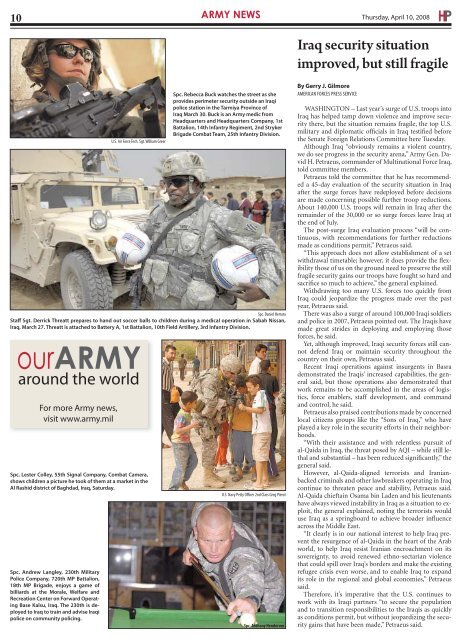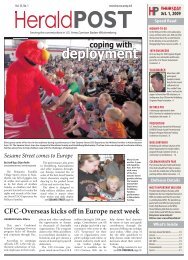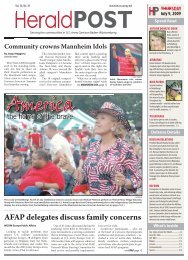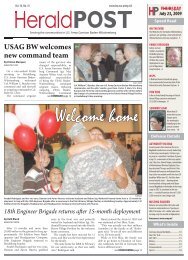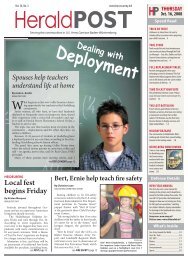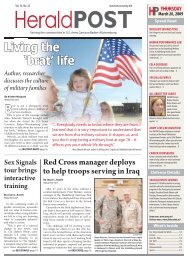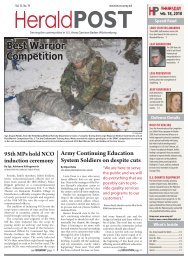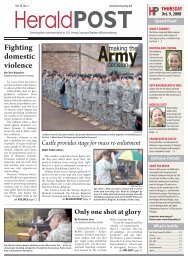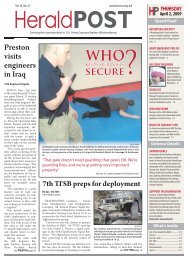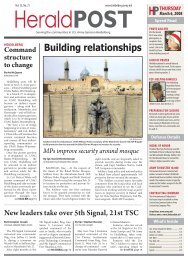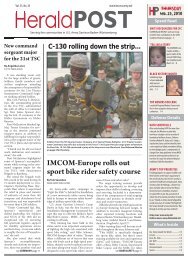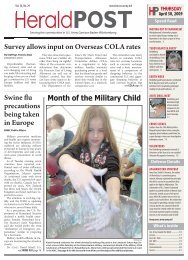01_HP (Page 1) - Herald-Post
01_HP (Page 1) - Herald-Post
01_HP (Page 1) - Herald-Post
You also want an ePaper? Increase the reach of your titles
YUMPU automatically turns print PDFs into web optimized ePapers that Google loves.
10 ARMY NEWS<br />
Thursday, April 10, 2008 <strong>HP</strong><br />
Iraq security situation<br />
improved, but still fragile<br />
Spc. Daniel Herrara<br />
Staff Sgt. Derrick Threatt prepares to hand out soccer balls to children during a medical operation in Sabah Nissan,<br />
Iraq, March 27. Threatt is attached to Battery A, 1st Battalion, 10th Field Artillery, 3rd Infantry Division.<br />
ourARMY<br />
around the world<br />
For more Army news,<br />
visit www.army.mil<br />
Spc. Lester Colley, 55th Signal Company, Combat Camera,<br />
shows children a picture he took of them at a market in the<br />
Al Rashid district of Baghdad, Iraq, Saturday.<br />
Spc. Andrew Langley, 230th Military<br />
Police Company, 720th MP Battalion,<br />
18th MP Brigade, enjoys a game of<br />
billiards at the Morale, Welfare and<br />
Recreation Center on Forward Operating<br />
Base Kalsu, Iraq. The 230th is deployed<br />
to Iraq to train and advise Iraqi<br />
police on community policing.<br />
U.S. Air ForceTech. Sgt.William Greer<br />
Spc. Rebecca Buck watches the street as she<br />
provides perimeter security outside an Iraqi<br />
police station in the Tarmiya Province of<br />
Iraq March 30. Buck is an Army medic from<br />
Headquarters and Headquarters Company, 1st<br />
Battalion, 14th Infantry Regiment, 2nd Stryker<br />
Brigade Combat Team, 25th Infantry Division.<br />
U.S. Navy Petty Officer 2nd Class Greg Pierot<br />
Spc. Anthony Henderson<br />
By Gerry J. Gilmore<br />
AMERICAN FORCES PRESS SERVICE<br />
WASHINGTON – Last year’s surge of U.S. troops into<br />
Iraq has helped tamp down violence and improve security<br />
there, but the situation remains fragile, the top U.S.<br />
military and diplomatic officials in Iraq testified before<br />
the Senate Foreign Relations Committee here Tuesday.<br />
Although Iraq “obviously remains a violent country,<br />
we do see progress in the security arena,” Army Gen. DavidH.Petraeus,<br />
commander of Multinational Force Iraq,<br />
told committee members.<br />
Petraeus told the committee that he has recommended<br />
a 45-day evaluation of the security situation in Iraq<br />
after the surge forces have redeployed before decisions<br />
are made concerning possible further troop reductions.<br />
About 140,000 U.S. troops will remain in Iraq after the<br />
remainder of the 30,000 or so surge forces leave Iraq at<br />
the end of July.<br />
The post-surge Iraq evaluation process “will be continuous,<br />
with recommendations for further reductions<br />
made as conditions permit,” Petraeus said.<br />
“This approach does not allow establishment of a set<br />
withdrawal timetable; however, it does provide the flexibility<br />
those of us on the ground need to preserve the still<br />
fragile security gains our troops have fought so hard and<br />
sacrifice so much to achieve,” the general explained.<br />
Withdrawing too many U.S. forces too quickly from<br />
Iraq could jeopardize the progress made over the past<br />
year, Petraeus said.<br />
There was also a surge of around 100,000 Iraqi soldiers<br />
and police in 2007, Petraeus pointed out. The Iraqis have<br />
made great strides in deploying and employing those<br />
forces, he said.<br />
Yet, although improved, Iraqi security forces still cannot<br />
defend Iraq or maintain security throughout the<br />
country on their own, Petraeus said.<br />
Recent Iraqi operations against insurgents in Basra<br />
demonstrated the Iraqis’ increased capabilities, the general<br />
said, but those operations also demonstrated that<br />
work remains to be accomplished in the areas of logistics,<br />
force enablers, staff development, and command<br />
and control, he said.<br />
Petraeus also praised contributions made by concerned<br />
local citizens groups like the “Sons of Iraq,” who have<br />
played a key role in the security efforts in their neighborhoods.<br />
“With their assistance and with relentless pursuit of<br />
al-Qaida in Iraq, the threat posed by AQI – while still lethal<br />
and substantial – has been reduced significantly,” the<br />
general said.<br />
However, al-Qaida-aligned terrorists and Iranianbacked<br />
criminals and other lawbreakers operating in Iraq<br />
continue to threaten peace and stability, Petraeus said.<br />
Al-Qaida chieftain Osama bin Laden and his lieutenants<br />
have always viewed instability in Iraq as a situation to exploit,<br />
the general explained, noting the terrorists would<br />
use Iraq as a springboard to achieve broader influence<br />
across the Middle East.<br />
“It clearly is in our national interest to help Iraq prevent<br />
the resurgence of al-Qaida in the heart of the Arab<br />
world, to help Iraq resist Iranian encroachment on its<br />
sovereignty, to avoid renewed ethno-sectarian violence<br />
that could spill over Iraq’s borders and make the existing<br />
refugee crisis even worse, and to enable Iraq to expand<br />
its role in the regional and global economies,” Petraeus<br />
said.<br />
Therefore, it’s imperative that the U.S. continues to<br />
work with its Iraqi partners “to secure the population<br />
and to transition responsibilities to the Iraqis as quickly<br />
as conditions permit, but without jeopardizing the security<br />
gains that have been made,” Petraeus said.


